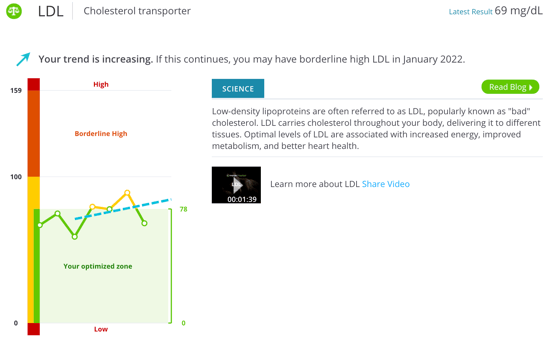![]() Dementia has an established genetic component, meaning that your risk of developing it increases if someone in your close family has or had the disease. But unfortunate genetics don't solidify your fate. In fact, even people with the highest genetic risk can lower their likelihood of developing the disease with healthy habits and optimized biomarkers. So that's what I'm doing.
Dementia has an established genetic component, meaning that your risk of developing it increases if someone in your close family has or had the disease. But unfortunate genetics don't solidify your fate. In fact, even people with the highest genetic risk can lower their likelihood of developing the disease with healthy habits and optimized biomarkers. So that's what I'm doing.
Dementia has established genetic components
The Alzheimer's Association states that the number one risk factor for dementia is age, as the majority of people who are diagnosed are 65 or older. [1] Now, I don't know about you, but I plan to not only live to see 65, but to thrive many years beyond. So I want to do everything in my power to protect my brain and prepare it for a long life ahead.Next, a family history of the disease is also associated with a higher risk—an immediate family member (parent or sibling) with the disease is especially predictive. [1] Unfortunately, my family history with the disease is strong—I've had two grandparents die of dementia-related causes, and my dad was diagnosed with Alzheimer's at 63 years old. So it's time to get real: my genetic risk of developing some sort of dementia is higher than the average person.
But genes don't dictate for certain whether someone gets dementia
There's good news here, though. The Alzheimer's Association states that, 99% of the time, genes don't guarantee someone will or won't develop dementia*. [2] In most instances, certain variants of genes are associated with a higher risk of developing the disease, but don't assure it. This is all to say, in most cases, your genes don't dictate with certainty whether you'll develop the disease. Your likelihood of developing it, even if it's common in your family, is within your power!*In less than 1% of cases, called early onset Alzheimer's disease, a specific genetic mutation does guarantee the eventual development of the disease, typically before the age of 50. [1]
This year, the American Medical Association published a paper with results that definitely look optimistic—especially for someone with high dementia risk. [3] They found that, even in people with the highest genetic risk of developing Alzheimer's and other types of dementia, a healthy lifestyle significantly reduces the likelihood of actually developing them.
Ok, so as you might expect, people with low genetic risk and a healthy or "favorable" lifestyle had the lowest risk of any group (good genes+good lifestyle= great outcome). On the other hand, people with a high genetic risk and unfavorable lifestyle had the highest (unfortunate genes+poor lifestyle= worst outcome). But the other combinations of lifestyle and genetic risk had less obvious patterns.
![]()
The researchers found that people who had a high genetic risk but lived healthy lives lowered their risk of developing dementia by 35%. [3] Not only that, but people with a high genetic risk could lower their likelihood to that of someone with a lower genetic risk if they made healthy choices. That's how much lifestyle matters!
So I'm incorporating dementia-preventing habits into my daily life
Locked and loaded with this information, I'm not wasting any time to ensure I'm checking the boxes of a healthy lifestyle. Here are habits you can pick up to prevent the progression of dementia and Alzheimer's:-
- No smoking tobacco. Period. It's been proven to be associated with many chronic diseases, including dementia. [4]
- Moderate alcohol intake. This means up to 1 drink a day for women, and 2 per day for men. [5]
- Staying physically active. Higher levels of physical activity, particularly aerobic exercise, can improve cognition and ward off dementia. [6-8]
- Getting enough sleep. Adequate sleep time is essential for preventing cognitive decline.
- Avoiding foods with negative brain health effects. Processed and unprocessed meats are associated with stroke and cognitive decline. [9,10]
- Eating a diet full of brain-boosting foods, particularly ones packed with fiber, antioxidants, and fish oil.
![]()
And I'm managing my risk of dementia by monitoring and optimizing blood biomarkers
There's also lots of evidence to support the fact that managing biomarkers in our blood can help to prevent or delay the onset of dementia:- High blood glucose levels are associated with an increased risk of dementia, even in people without diabetes, so I'm taking action to keep mine within my personal optimized zone. [11] Here's an article about how InsideTracker defines "optimized zones" of blood biomarkers, including glucose.
- High levels of hsCRP—a marker of general inflammation—are also associated with a higher risk of dementia, particularly in people younger than 70. [12,13] Because hsCRP measures full-body inflammation, lots of things can make it rise. But there are also lots of options for reducing it, too.
- Elevated LDL (bad) and low HDL (good) cholesterol levels are both associated with higher risks of dementia and with the build-up of a substance called β-amyloid, which can kill brain cells. [14,15] I personally struggle to optimize these biomarkers, so I'm using InsideTracker for personalized recommendations on how to do so.

- Low blood vitamin D levels are strongly associated with an increased risk of dementia, particularly in combination with poor antioxidant status. [16]
- High triglycerides—the most common form of fat circulating in the blood—are also associated with an increased risk of dementia. [16] One of the most common causes of elevated triglycerides is a diet rich in processed, refined carbs, so I focus on eating whole, fiber-rich carb sources.
So, yes, I have a high genetic risk for dementia and Alzheimer's. But research seems to be pretty consistent: I have control over how likely I am to ultimately develop one or the other. I can't change my DNA, but I can change what I do about it.
Learn how your biomarkers affect your body in this FREE e-Book download!
References:
[1] https://www.alz.org/alzheimers-dementia/what-is-alzheimers/causes-and-risk-factors
[2] https://www.alz.org/alzheimers-dementia/what-is-alzheimers/causes-and-risk-factors/genetics
[3] https://jamanetwork.com/journals/jamaneurology/article-abstract/801799
[4] https://www.ncbi.nlm.nih.gov/pubmed/25763939
[5] https://www.sciencedirect.com/science/article/abs/pii/S1064748112607659?via%3Dihub
[6] https://bmcpublichealth.biomedcentral.com/articles/10.1186/1471-2458-14-510
[7] https://www.ncbi.nlm.nih.gov/pubmed/?term=26305771
[8] https://www.ncbi.nlm.nih.gov/pubmed/?term=31080412
[9] https://www.ncbi.nlm.nih.gov/pubmed/?term=20479151
[10] https://www.ncbi.nlm.nih.gov/pubmed/?term=26086182
[11] https://www.ncbi.nlm.nih.gov/pubmed/23924004
[12] https://www.ncbi.nlm.nih.gov/pubmed/29629537
[13] https://www.ncbi.nlm.nih.gov/pubmed/29387136
[14] https://jamanetwork.com/journals/jamaneurology/article-abstract/801799
[15] https://jamanetwork.com/journals/jamaneurology/article-abstract/1791528
[16] https://www.sciencedirect.com/science/article/abs/pii/S1552526017300869?via%3Dihub


